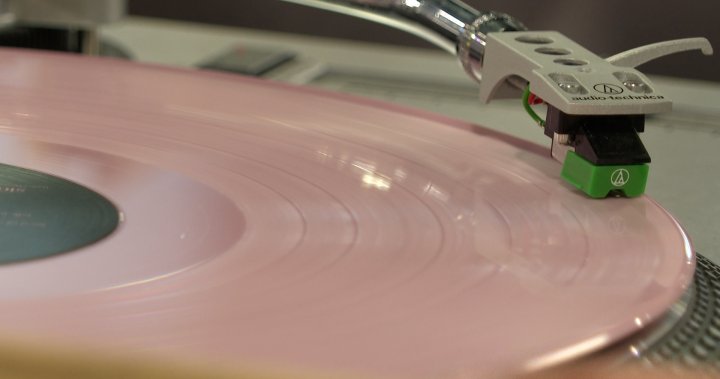I know exactly how many single compact discs I bought this year: Zero. None. The only new CDs to enter my collection came as part of big box sets that feature rarities from The Who, The Tragically Hip, Pink Floyd, and a few others. When I wanted to hear any album, new or old, I simply fired up a streaming service.
On the other hand, I lost count of the number of new vinyl records that were added to my collection. Dozens, for sure. Some were brand new while others were bought used at independent shops and record shows. I bought into the vinyl resurrection so hard that I bought a brand new two-channel stereo system with a turntable just so I could listen to my new records.
This seems to mirror Canada as a whole. According to Luminate, the counter of music sales in Canada, the market for compact discs continues to shrink. One of the very last sales reports of 2023 shows that 12.7 per cent fewer compact discs were sold this year with the latest raw number being 1,898,738 units. Think about that for a second: In a country of 40 million, less than two million CDs from all eras were sold across the nation.
Streaming is a big part of this decline. On-demand audio streams in Canada are over 139 billion listens (yes, 139 billion), an increase of 15.3 per cent from 2023. For the week ending Dec. 14 alone, we streamed over three billion songs, 18 per cent more than the same week last year. That’s an all-time high.
More on Entertainment
Meanwhile, vinyl sales were up dramatically. The latest year-to-date figure I have shows an increase of 25.8 per cent over 2022, with a total of 1,257,435 pieces of fresh vinyl flying out of stores. And because a vinyl album is far more expensive than a CD, the revenue from vinyl sales far exceeds that of compact discs.
One more stat: Vinyl sales have been within 3,000 units of CD sales lately. It’s possible that by the end of the year, thanks to Christmas shopping and Boxing Day spending, more vinyl will be sold in a week than CDs. At this rate, vinyl sales may eclipse those of CDs by sometime next year. The last time that happened was in the very early 1990s. And don’t get me started on the high demand for used vinyl, sales of which are not tracked by Luminate. Anecdotally, it appears that used vinyl far, far outsells used CDs, so, likely, more vinyl records are already being sold than CDs.
Turntables sales continue to do very well, from the cheapest Crosley record players to high-end models from companies like Pro-Ject. Many audio shops have dedicated turntable sections with a dozen or more on display, dwarfing any selection of CD players they might have available — if they have any at all.
Yes, vinyl is booming, maintaining a winning streak that began in 2008 with the inaugural Record Store Day. No one saw this coming.
But how long can this last? If you look out at the horizon, you can see a few storm clouds gathering.
A big issue is cost. In the early days of assembling my record collection, vinyl cost around $7.99 per album, equivalent to almost $25 in today’s money. While it is possible to find a new vinyl album today for that price, most cost well beyond that. A quick tour through Amazon.ca shows that the Tragically Hip’s Up to Here album costs $44.99. A copy of volume one of the Yer Favourites greatest hits collection is an eye-watering $65.99. Most Taylor Swift vinyl is going for beyond $60, too.
That’s a lot of money. No wonder used vinyl is in such great demand. You have to wonder how long people will continue to pay these prices. It’s one thing if you’re a boomer or gen Xer, but if you’re a struggling millennial or a member of gen Z, buying new vinyl probably isn’t at the top of your list of priorities. High prices are keeping the next generation of collectors out of the market, something that spells doom for the future.
History is also repeating itself in reverse. After CDs were introduced, people threw out their old vinyl collections and re-purchased every title on CD, leading to a recorded music industry boom that lasted until the internet ruined everything starting in about 2000. Now people are re-purchasing their collections again, except that this time, they’re replacing the vinyl they had once tossed away in favour of CDs. At some point, this part of the marketplace will become saturated. What then?
Then there’s the issue of streaming. Older music fans have been slow to adopt the new technology, but they’re catching on. And with the sonic quality of streaming and audio devices finally moving beyond MP3 quality to better-than-CD audio (cf. Apple’s Spatial Audio, Dolby ATMOS, Sony 360, FLAC, Hi-Res Audio, MQA, etc.) and thus better-than-vinyl sound, it’s probably inevitable that we’ll see a technological jump that will once again see physical media (i.e. vinyl) go into decline.
Our resurrected obsession with vinyl won’t end tomorrow, next year, or even the year after that. But while the good times are rolling right now, they won’t last forever. You’ve been warned.
—
Alan Cross is a broadcaster with Q107 and 102.1 the Edge and a commentator for Global News.
Subscribe to Alan’s Ongoing History of New Music Podcast now on Apple Podcast or Google Play
© 2023 Corus Radio, a division of Corus Entertainment Inc.



